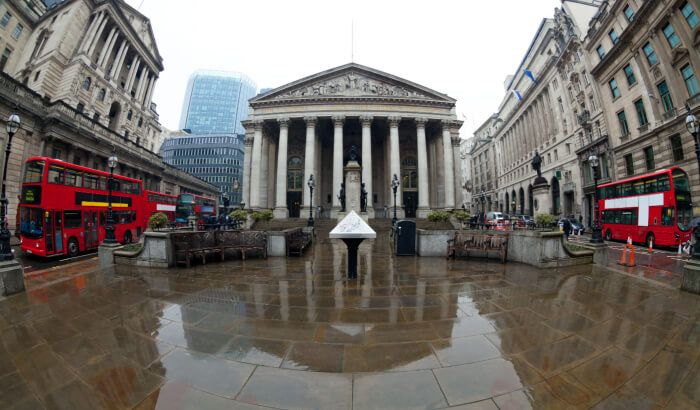Tuesday Sep 26 2023 10:21

6 min

The FTSE 100 index (UK100) saw a 0.78% decline on Monday, closing at 7,623.99. It had earlier hit an intra-day low of 7,580.81.
This decline extended slight losses observed in the previous week, primarily due to emerging concerns regarding the economic situation in China and the continued hawkish leanings from major central banks, such as the Bank of England, U.S. Federal Reserve and European Central Bank, which have indicated a higher-for-longer interest rate scenario is likely on the cards for the foreseeable future.
Sticky inflation and low growth is pushing bond yields higher and equity markets lower, impacting blue-chip indices such as London’s blue-chip FTSE 100. The yield on 10-year U.S. Treasuries has crossed 4.5%, a level not seen since October 2007, while the coupon on 10-year German bunds has risen above 2.8% — its highest level since 2011.
Companies with significant exposure to the Chinese economy and fluctuations in U.S. borrowing costs ---— particularly industrial mining firms —were the most affected in yesterday’s trading.
Rio Tinto (RIO) and Antofagasta saw a 2% drop, while Anglo-American (AGLJ) and Fresnillo (FRES) booked a declines of over 1%. Luxury brand Burberry saw a 4.5% decrease in its stock value, and Prudential, which has a strong presence in Hong Kong, fell by 2.7%.
Shares in gambling company Entain's stock plummeted by 13% following a downgrade in its sales forecasts, as it warned of slower growth in online gaming revenue stemming Italy and Australia, along with regulatory headwinds in the UK.
Сalculate your hypothetical P/L (aggregated cost and charges) if you had opened a trade today.
Market

Instrument


Account Type
Direction
Quantity
Amount must be equal or higher than
Amount should be less than
Amount should be a multiple of the minimum lots increment
USD
EUR
GBP
CAD
AUD
CHF
ZAR
MXN
JPY
Value
Commission
Spread
Leverage
Conversion Fee
Required Margin
Overnight Swaps
Past performance is not a reliable indicator of future results.
All positions on instruments denominated in a currency that is different from your account currency, will be subject to a conversion fee at the position exit as well.
The Financial Times-Stock Exchange 100 Share Index, commonly known as the FTSE 100, or more informally, the “Footsie” is an index that monitors the performance of the 100 largest publicly traded companies based on their market capitalization and listed on the London Stock Exchange (LSE). The name "FTSE" is an acronym derived from the Financial Times and the LSE, its original parent organizations.
Today, ownership and maintenance of the FTSE 100 index rest with the London Stock Exchange Group. It holds a comparable significance in London's financial landscape as the U.S. Dow Jones Industrial Average (USA30) and S&P 500 (US500) do in the United States. The FTSE 100 serves as the primary gauge of the broader U.K. stock market's performance.
The FTSE 100's level is calculated by using the total market capitalization of its constituent companies and the index value. The total market capitalization is subject to change throughout the trading day, as individual share prices of the indexed companies fluctuate, consequently affecting the index value.
When the FTSE 100 is reported as moving up or down, it is compared to the previous day's closing market value. This calculation takes place continuously during each trading day, commencing at 8:00 a.m. at the market opening and concluding at the LSE's 4:30 p.m. closing time. A decline in the FTSE 100 indicates a decrease in the combined value of the largest companies listed in the United Kingdom, whereas a new high suggests that the overall worth of these indexed companies has increased.
Inclusion in the FTSE 100 is contingent on a company’s listing on the LSE rather than its country of registration — a country doesn’t have to be based in the UK to be considered as a potential index constituent. Many of the listed firms are international in scope, conducting a significant portion of their business overseas, which means the exchange rate of the British pound plays a role in their valuation. A weaker pound may increase the value of a dollar-based company when translated into pounds, while a stronger pound can reduce the earnings of companies primarily operating in Europe or other countries.
To make sure the FTSE 100's composition stays relevant, a quarterly review is conducted to ensure it includes the companies with the highest market capitalization.
As of September 26, 2023, the top 10 largest companies by market capitalization included in the FTSE 100 are as follows:
When considering indices or shares for trading and price predictions, remember that trading CFDs involves a significant degree of risk and could result in capital loss.
Past performance is not indicative of any future results. This information is provided for informative purposes only and should not be construed to be investment advice.
Asset List
View Full ListLatest
View all
Wednesday, 16 April 2025

4 min

Wednesday, 16 April 2025

5 min

Wednesday, 16 April 2025

5 min


